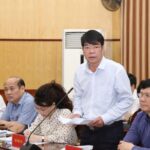Political Resolution 68 sends a clear political message from the Party and State leaders, placing private enterprises at the center of economic development.
The proposal to limit inspections and audits will not only reduce administrative burdens but also promote a healthy business environment. It demonstrates a reform-oriented approach to economic management, striking a balance between control and development.
**Reducing the Burden on Businesses**
Mr. Tran Quoc Manh, CEO of Sadaco, views the regulation of one inspection per year as stipulated in Resolution 68 as a positive signal. This reflects a trend towards reducing burdens on enterprises. In practice, the frequency of periodic inspections, such as in the tax field, has decreased, and it could be once every 3-5 years. The situation where enterprises have to receive multiple inspection teams multiple times a year has lessened in the past few years.
However, Mr. Manh pointed out that the main burden now lies in administrative procedures. This is the barrier that needs to be removed to allow private enterprises to flourish, in line with the spirit of the resolution, which regards them as an important force in the economy. The Sadaco leader gave an example:
> “Regarding taxes, when there are changes in the structure, such as the dissolution or merger of a department, there may be problems in updating tax information. Fire protection-related procedures are also challenging. Many current fire protection regulations are difficult for manufacturing enterprises to meet. Policies should provide support instead of creating barriers. There are other effective fire protection solutions that are not accepted or are restricted, resulting in unnecessary costs.”
Dr. To Hoai Nam, Vice President and General Secretary of the Vietnam Association of Small and Medium Enterprises (VINASME), agreed that Resolution 68 is a solution to the problem of overlapping inspections.
|
| —- | —- |
|

Inspection of enterprises once a year as per Resolution 68 is a positive signal. Photo: QH
|
Administrative reform should shift the role of management agencies from controlling to supporting enterprises. Reduce the frequency of inspections and go along with removing obstacles in administrative procedures.
Mr. TRAN QUOC MANH, CEO of Sadaco
|
According to Mr. Nam, limiting inspections to once a year has three significant impacts. Firstly, it reduces administrative burdens and compliance costs. Enterprises no longer have to receive multiple teams in a year, which is especially meaningful for small and medium-sized enterprises amid countless difficulties. Previously, each agency inspected once, but an enterprise could receive multiple teams. The new regulation requires coordination among agencies. However, if there are signs of violations, inspections will still be conducted.
Secondly, it prevents negative behaviors and the abuse of power. Limiting inspection frequency will reduce opportunities for corruption and extortion, bringing transparency to inspection activities. Management agencies cannot inspect arbitrarily but must base their actions on evidential signs of violations rather than anonymous letters. “This forces the inspection agencies to have focused plans and work more responsibly,” emphasized Dr. Nam.
Thirdly, it benefits a healthy business environment. Enterprises will be aware of the schedule and can prepare accordingly, improving compliance and reducing passivity. More importantly, this encourages enterprises’ self-inspection. This regulation will “force” sectors like taxation, environment, and labor to coordinate and interconnect, especially when the digital platform can meet the requirements. This is a concrete step in realizing the viewpoint of putting enterprises at the center and shifting from pre-inspection to post-inspection.
**Lesson on Transparency from Singapore**
The story of a Vietnamese director choosing Singapore as the regional headquarters when expanding into Southeast Asia raises many questions. Besides location, logistics, and investment access, the director of this company shared:
> “We chose Singapore because of its taxes, fees, and administrative procedures. The business registration process is fast, simple, and efficient. The Singapore government also has many investment promotion policies and supports startups and small and medium-sized enterprises.”
Finance expert Tran Dinh Phuong analyzed that Singapore’s strengths include transparency, consistency in its legal system and management. Singapore strictly enforces the law, with clear and publicly available regulations, creating a predictable business environment that reassures enterprises in their long-term planning without worrying about unexpected inspections or inconsistencies.
Mr. Phuong shared:
> “Vietnam has much to learn from Singapore in creating a favorable business environment, especially regarding what Resolution 68 mentions. Like Singapore, we still have supervision and inspections, especially in finance, occupational safety, and the environment. But the difference lies in transparency, efficiency, and compliance with procedures. Enterprises are usually notified in advance, with specific objectives and strict procedures, reducing disruptions and encouraging enterprise cooperation.”
Therefore, the expert suggested that Vietnam needs an effective coordination mechanism between ministries, sectors, and localities and increased transparency in inspection plans. Focus on prevention and handle violations with clear evidence instead of inspecting multiple times a year.
**Putting Resolution 68 into Practice**
To bring Resolution 68 into reality, Dr. To Hoai Nam proposed three solutions. Firstly, prioritize inspections and audits based on information technology. Leverage digital platforms to analyze data and decide on focused inspections, limiting direct inspections of compliant enterprises.
|
| —- |
|
Resolution 68 will be an important turning point, improving the investment environment and enhancing competitiveness. It demonstrates a reform-minded approach to economic management, balancing control and development.
|
Secondly, clearly and specifically define the cases eligible for inspection. Enumerate the signs of violations in detail according to behavior and sector to determine accurately and avoid arbitrary application.
Thirdly, clearly define the responsibilities of the inspecting agencies and inspectors. State agencies must comply with the law and professional ethics. They should only do what the law permits and not prolong unnecessary inspections. If an inspection is based on an assessment of signs of violations, but the enterprise is found to be compliant, the decision-maker must take responsibility.
“The inspection results must be made public. After the conclusion, it should be announced. Enterprises that perform well will have their reputations affirmed. Violating enterprises will serve as a general warning. Publicity also creates reverse pressure on the inspecting agencies, forcing them to be cautious and objective,” suggested Dr. Nam.
Dr. To Hoai Nam believes that if these solutions are implemented synchronously, Resolution 68 will be a crucial turning point, improving the investment environment and enhancing competitiveness. It demonstrates a reform-minded approach to economic management, balancing control and development.
**Using PCI as an Early Warning System for Business Obstacles**
The Provincial Competitiveness Index (PCI) 2024 shows improvements in local economic governance, with the median score reaching 67.67, an increase from the previous year and the eighth consecutive year above 60 points. This reflects a favorable business environment. The original PCI also continued to improve, reflecting the efforts of local reforms and supervision from enterprises. PCI is likened to a policy “radar,” helping to detect business obstacles early on and aiming for a transparent and fair investment environment.
However, PCI 2024 also revealed worrying issues, especially regarding environmental inspections. The increase in the number of inspections and the level of enforcement has caused more dissatisfaction among enterprises regarding procedural burdens and fairness. The proportion of enterprises considering environmental inspections as an excessive burden increased from 5% (2023) to 11.5% (2024). Only 1.1% of enterprises acknowledged the coordination between inspection teams, and only 25% considered the inspections fair, a 5% decrease from 2023.
Alarmingly, the proportion of enterprises paying unofficial costs to environmental inspectors doubled from 22% (2023) to 50% (2024). This indicates that while inspections play a certain role, there is a need for improved procedures and regulations so that enterprises recognize their necessity and fairness.
Mr. PHAM TAN CONG, President of the Vietnam Chamber of Commerce and Industry (VCCI)
QUANG HUY – PHUONG MINH
– 07:41 05/09/2025
The Pi Network’s Transactions: A Special Listing Conundrum
Despite the Pi Network (Pi) token officially listing on the OKX exchange, not everyone can trade freely.





















